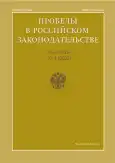On automation and digitalization of the postgraduate education process in the training of highly qualified personnel: legal aspect
- Authors: Belikova K.M.1
-
Affiliations:
- Kutafin Moscow State Law University (MSAL)
- Issue: Vol 18, No 1 (2025)
- Pages: 62-73
- Section: Private Law (Civil) Sciences
- URL: https://bakhtiniada.ru/2072-3164/article/view/288810
- DOI: https://doi.org/10.33693/2072-3164-2025-18-1-62-73
- EDN: https://elibrary.ru/SVMZOI
- ID: 288810
Cite item
Abstract
The subject matter of this article is the relations in the field of education, in the context of the automation and digitalisation of the process of graduate studies in higher education to prepare highly qualified personnel, from the perspective of law, based on a number of Russian regulatory legal acts, including: the 2012 Education Law of December 29, 2012, No. 273-FZ; the 1996 Science and State Science and Technology Policy Law of August 23, 1995, No 127-FZ; the Government Decree No. 30 on Scientific and Pedagogical Staff Training for Postgraduate Studies of November 30, 221; Russian Government Regulation No. 842 on Awarding Scientific Degrees of September 24, 213; Decree of the President of Russia No. 13 on Certain Issues of Improving the Higher Education System of May 12, 334; et al.
The author proceeds from the objective and subjective premises of the world, relying on dialectics during the research as a method of argumentation, a form and way of reflective theoretical thinking, as well as scientific methods of researching private and public law (for example, the comparative legal method), the method of functional analysis, etc. The scientific novelty stems from the purpose of the study.
The author concludes that:
- The dialectical approach to postgraduate education based on modern information technology is morally, ethically, and pedagogically sound.
- To implement the aforementioned dialectical approach to graduate education, the development of a draft federal Gantt chart is needed based on artificial intelligence algorithms for all types of graduate work, including its discussion with the scientific community, the Ministry of Education and Science, the Russian Academy of Sciences, and the Higher Attestation Commission to introduce changes and amendments to the draft.
- Based on the draft adopted as a basis (paragraph 2), in accordance with established procedures, amendments and additions are made to legislative and other acts related to training highly qualified personnel in this area.
Full Text
##article.viewOnOriginalSite##About the authors
Ksenia M. Belikova
Kutafin Moscow State Law University (MSAL)
Author for correspondence.
Email: KMBelikova@msal.ru
ORCID iD: 0000-0001-8068-1616
SPIN-code: 2541-3498
Dr. Sci. (Law), Prof., Professor of the Department of Entrepreneurial and Corporate
Russian Federation, MoscowReferences
- Belikova K. M. (2024). The problem of legal assessment of the content of scientific and educational texts from the perspective of the author's role and place in the generative content of neural networks. Law and politics, 1, Pp. 1–22. doi: 10.7256/2454-0706.2024.1.69692. EDN: LRKPFL. URL: https://nbpublish.com/library_read_article.php?id=69692 (accessed: 30.06.2024).
- Belikova K. M. (2023). Does Russia need a fixed percentage of originality and the very originality of scientific papers: reflections of a lawyer. Legal researches, 3, Pp. 62–104. doi: 10.25136/2409-7136.2023.3.40421. EDN: MGAHSR. URL: https://nbpublish.com/library_read_article.php?id=40421 (accessed: 12.06.2023).
- Belikova K. M., Diaz Martins R., Kazanba E. T. (2024). International cooperation in overcoming digital inequality: legal foundations, barriers and development parameters. Journal of Digital Technologies and Law, 2(4), Pp. 1003–1030. https://doi.org/10.21202/jdtl.2024.47 URL: https://www.lawjournal.digital/jour/article/view/490/206 (accessed: 31.12.2024).
- Chard R., Pruyne J., McKee K. et. al. (2023). Globus automation services: Research process automation across the space-time continuum. Future Generation Computer Systems, 142. Pp. 393–409. https://doi.org/10.1016/j.future.2023.01.010.
- Bernabei M., Costantino F. (2024). Adaptive automation: Status of research and future challenges. Robotics and Computer-Integrated Manufacturing, 88, Pp. 102724. https://doi.org/10.1016/j.rcim.2024.102724.
- Feinauer S., Schuller L., Gro, I., et al. (2022). The potential of gamification for user education in partial and conditional driving automation: A driving simulator study. Transportation Research Part F: Traffic Psychology and Behaviour, 90, Pp. 252–268. https://doi.org/10.1016/j.trf.2022.08.009.
Supplementary files










